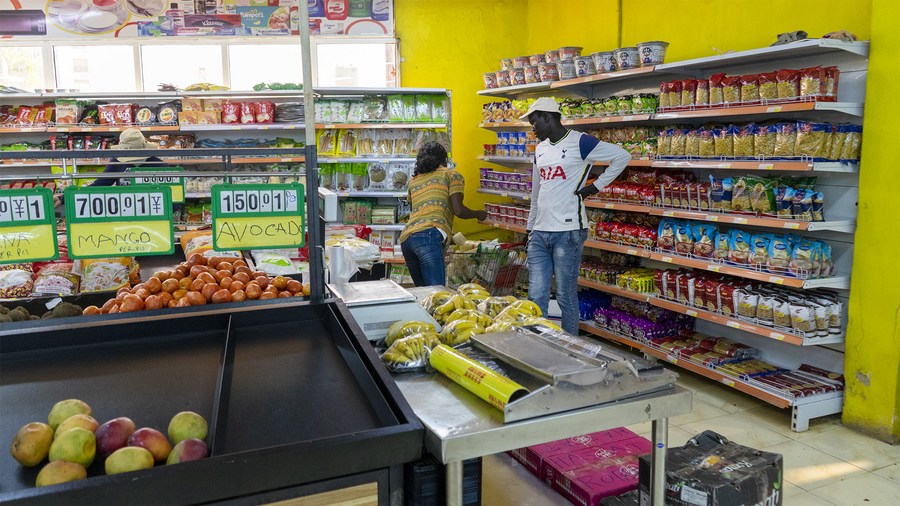Chinese investor lifting South Sudanese out of economic crisis

Customers buy goods at Lily Supermarket in Juba, capital of South Sudan, Nov. 15, 2021. (Xinhua/Ruot George)
Lily Supermarket, owned by a Chinese investor, is fast becoming one of the leading places to shop in South Sudan's capital Juba.
JUBA, Nov. 17 (Xinhua) -- Lily Supermarket, owned by a Chinese investor, is fast becoming one of the leading places to shop in South Sudan's capital Juba.
First opened in 2017 as a small shop, Lily Supermarket has expanded to become one of the giant supermarkets in the country, complete with a bar, restaurant and bakery.
It's one place that has employed 40 South Sudanese and indirectly helped hundreds of them wade through a dire economic crisis caused by war.
Santino Ayup Mou, employed to work in the bar, just can't hide an exuberant mood about his job.
"Working with the Chinese here has been the perfect choice for me because we receive salaries on time not like other work that we do work and stay for two months without salaries," the 23-year-old Mou told Xinhua at the Supermarket.
Bakhita Josephine who is employed in the shop section of the Supermarket echoed a similar sentiment.
"I have learned a lot from them and they have also learned a lot from me, I found that the Chinese are social people," the 24-year-old lady said.
"Before working with them I had the impression that Chinese are bad, they overuse you and do not pay salaries, I came here with that mentality," Josephine said.
"I thought I was coming to be overworked but when I reach here, it was different. They gave me small workload that is easy to manage, they give us lunch and breakfast apart from our salaries," she said.

People are seen outside Lily Supermarket in Juba, capital of South Sudan, Nov. 15, 2021. (Xinhua/Ruot George)
Lily's Supermarket has stood the test of the crisis in the African nation to continue delivering economic empowerment to South Sudanese as well as providing quality goods at cheap prices.
It's one of the many Chinese investments that maintained service in the country, providing much needed provisions while many businesses closed.
Its pocket-friendly nature makes it the darling for people whose purchasing power has been eroded by an economic crisis caused by the war fought between 2013 and 2018.
Lily's Supermarket is not a high-end Supermarket, but affordable and easily accessible at its location in the capital.
Paul Jimbo, a humanitarian aid worker who regularly visits the Supermarket, attested to this in an interview.
"Lily is strategically located and it's on one of the major roads, commodities are cheap and fresh," Jimbo said.
At the counter, Margaret Kiden was paying for the commodities she purchased from the supermarket.
"It's a lovely supermarket, so welcoming, it has good customer care, it's cheap and the things here are original," Kiden said.
According to the Managing Director of Lily Supermarket, Wang Lei, Lily Supermarket was born out of the desire to serve South Sudanese during a difficult time in the crisis.
By 2017, the country was war-weary from a conflict that began in 2013 and only stopped with a peace agreement in 2018.
It destroyed the economy and reduced access to quality goods in the import-reliant country.
And according to Wang, the decision to open Lily Supermarket was made to fill in that gap in the economic sector.
"It was born in 2017, it developed like a human from a very small shop, it expanded, now it's Lily Supermarket," said Wang.
Wang said that of the 40 South Sudanese employees, 15 are female, and that 1 out of 3 employees at the managerial level are South Sudanese.
"The growth of Lily depends on the society here. Juba gave us opportunity, South Sudan gave us the opportunity," he said, while hailing the good relationship between Juba and Beijing.
"If you come to Lily, it can satisfy you since it can satisfy your demands and requirements, it's covering from food items, from stationaries, from all the kitchen use in daily lives, we have cafeteria and a bakery," he said.


